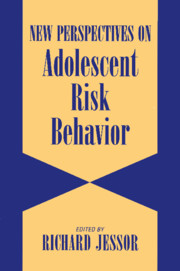Book contents
- Frontmatter
- Contents
- List of contributors
- Preface
- 1 New perspectives on adolescent risk behavior
- Part I A focus on development
- Part II A focus on problem behavior
- Part III A focus on sexual activity
- Part IV A focus on psychopathology
- Part V A focus on social role performance
- 11 Transition to adulthood among high-risk youth
- 12 Disengagement from school and problem behavior in adolescence: A developmental-contextual analysis of the influences of family and part-time work
- 13 New perspectives on adolescent work and the transition to adulthood
- Part VI Overview and integration
- Author index
- Subject index
13 - New perspectives on adolescent work and the transition to adulthood
Published online by Cambridge University Press: 06 July 2010
- Frontmatter
- Contents
- List of contributors
- Preface
- 1 New perspectives on adolescent risk behavior
- Part I A focus on development
- Part II A focus on problem behavior
- Part III A focus on sexual activity
- Part IV A focus on psychopathology
- Part V A focus on social role performance
- 11 Transition to adulthood among high-risk youth
- 12 Disengagement from school and problem behavior in adolescence: A developmental-contextual analysis of the influences of family and part-time work
- 13 New perspectives on adolescent work and the transition to adulthood
- Part VI Overview and integration
- Author index
- Subject index
Summary
This chapter concerns an activity, teen employment, which is not typically dealt with in studies of adolescent risk behavior. Certain behaviors, such as drinking and smoking, acting out in school, unprotected sex, and various forms of deviance, obviously pose clear risks to the healthy development of youth. They have therefore been given considerable attention in the scientific literature and are well represented in the present volume. It is widely believed that, unlike these behaviors, employment during the high school years is a good thing for youth, as it introduces them to an exceedingly important adult social role. If youthwork has such a preparatory function, it might even be considered protective, reducing the likelihood of problematic early life course trajectories and promoting such desirable outcomes as continued schooling and finding employment after leaving high school.
But despite widespread public approval, some have questioned whether early labor force participation might pose risks to teenagers if it draws them away from more valuable activities, such as schoolwork or extracurricular involvements. Employment itself may be risky if it exposes youth to workplace hazards or stressors at a time when requisite coping mechanisms have not yet been adequately developed. Thus, because we are examining a phenomenon that has heretofore been given relatively little attention, this chapter represents a new perspective on adolescent risk behavior. We assess the conditions under which teenage work may be enhancing as well as compromising to healthy development.
- Type
- Chapter
- Information
- New Perspectives on Adolescent Risk Behavior , pp. 425 - 496Publisher: Cambridge University PressPrint publication year: 1998
- 38
- Cited by



